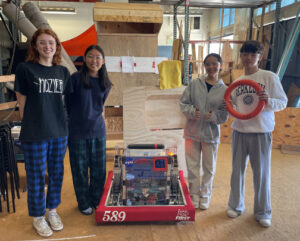
Photos by Mary O’KEEFE
With several check marks in the win column, CVHS Falkons are ready to head to Houston – if they receive financial support.
By Mary O’KEEFE
The Crescenta Valley High School Falkons 589 robotics team qualified for the FIRST world championship competition being held from April 17 to April 20 in Houston, Texas.
“We were finalists in the [FIRST] competition,” said Renee Limonadi, CVHS senior and 589 team member.
Since 2001, Falkons 589 has competed in the For Inspiration and Recognition of Science and Technology [FIRST] program. FIRST is a non-profit organization that “prepares young people for the future through a suite of inclusive, team-based robotics programs from ages 4 to 18,” according to firstinspires.org.
Each year the team gets a “game” from FIRST and then has only a few weeks to arrive at a game strategy and design, build and operate a robot. They then go to competitions where they are partnered with “alliances” of two other teams from other high schools.
Falkons 589 traveled to the Ventura Regionals this month where they placed second in the entire competition and were regional finalists.
“Our placement as finalist was throughout the robotics competition,” said Sabrina Soh, CVHS senior and member of 589. “At the end, during playoffs, we were able to work with two other teams [their alliance].”
They were the fifth alliance to compete.
“And then we got to finals,” she added.
There were 48 teams in the competition.
But wait – there’s more: as if winning second place and qualifying for the world competition in Houston wasn’t enough for this team…
“We won the Engineering Inspiration Award, which is a separate award. This is one of the biggest awards that you can win at regional,” said Limonadi.
This is much more than a single win, it is the recognition of all of the outreach the team has done throughout the year and how it presents its 589 team to the community.
It is what FIRST inspires students to do, Soh said.
“We talk about [that] a lot. [The recognition] is a result of all the outreach we’ve done, all the community building within ourselves and sponsors,” Soh said.
At the Ventura Regionals, judges visited each team. Students then presented the outreach they had done throughout the year.
“Basically we [each] have a booth, or pit, at the competition where we fix our robot,” Limonadi said. “Judges walk around to each pit [to talk to team members].
One of our [team members], Ethan Lee, was the finalist for the Dean’s List Award.”
The award recognizes the individual student’s contributions to the program and its leadership goals.
“Only two students at the entire regional competition received this distinction,” stated Jacob Poole, CVHS computer science and engineering teacher and 589 mentor. “Ethan Lee received the Dean’s List Finalist Award.”
Lee is a junior at CVHS. Rachelle Lee, another CVHS junior and 589 member, also competed for the award. Both students were required to go before a FIRST board and make a presentation as part of the competition.
And if you think all of this winning is easy, it is not. This 134-member team invested 15,230 working hours since January 2024.
This year’s game is Crescendo and required the robots to be autonomous during the first 15 seconds of the match. Then human drivers take over.
According to FIRST, “Robots collect notes from human players at their source and score them in their amp and speaker. Each time an alliance gets two notes in their amp, the human player can amplify their speaker for 10 seconds. Notes scored in an amplified speaker are worth more points than those scored in an unamplified speaker. A human player may choose to repurpose a note scored in their amp in cooperation with their opponent. If each alliance repurposes a note by hitting their Coopertition button in the first 45 seconds of teleop, all teams in the match receive a Coopertition point (which influences their rank in the tournament), and the number of notes needed for the melody bonus is reduced. As time runs out, robots race to get onstage and deliver notes to their traps. Harmonizing robots, i.e., robots sharing a chain, earn an added bonus. Robots earn even more points if a human player spotlights robots on a chain by scoring a note on the chain’s microphone.”
Falkons 589 team members have worked hard for this competition and their work has paid off with so many wins and recognitions. Now it needs funds to travel to the Houston, Texas competition.
For more information on how to support Falkons 589 and help the team get to the world competition, visit its PayPal campaign:
https://www.paypal.com/pools/c/92GlxkEHJh and/or their Facebook campaign:
https://www.facebook.com/donate/3629211017339884/903595871771499/ or email jpoole@gusd.net.
